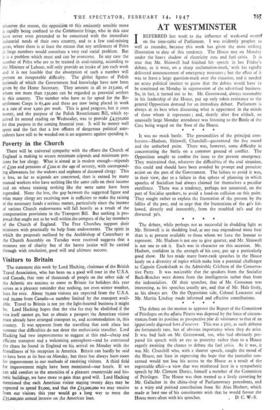AT WESTMINSTER
REFERRED last week to the influence of week-end eventi
on the time-table of Parliament. I was evidently prophet as well as recorder, because this week has given the most striking illustration to date of this tendency. The House met on Monday under the heavy shadow of electricity cuts and fuel crisis. It i3 true that Mr. Shinwell had finished his speech in last Friday's debate, as it were, on a sharp exclamation-mark, with his rapidly delivered announcement of emergency measures ; but the effect of it was to leave a large question-mark over the situation, and it needed no acute political instinct to guess that the debate would have to be continued on Monday in supersession of the advertised business. So, in fact, it turned out to be. Mr. Greenwood, always reasonable in his leadership of the House, put up only token resistance to the general Opposition demand for an immediate debate. Parliament is always at its best when discussing what is uppermost in the minds of those whom it represents ; and, shortly after five o'clock, an unusually large Monday attendance was listening to the Battle of the
Cuts being waged on the floor of the House. * * * *
It was no mock battle. The personalities of the principal com- batants—Hudson, Shinwell, Churchill—guaranteed the live round and the unbarbed point. There was, however, some difficulty in concentrating the battle on a common ground of conflict. The Opposition sought to confine the issue to the present emergency. They maintained that, whatever the difficulties of the coal situation, this could and should have been avoided by prompt and prescient action on the part of the Government. The failure to avoid it was, in their view, due to a failure in that sphere of planning in which apostles of Socialism had always claimed for themselves a peculiar excellence. There was a tendency, perhaps not unnatural, on the part of Socialist speakers, to avoid a head-on collision on this point. They sought rather to explain the frustration of the present by the follies of the past, and to urge that the frustrations of the 40's fol- lowed, directly and inexorably, from the troubled 20's and the
thwarted 30's. * * * * The debate, while perhaps not as successful in shedding light as Mr. Shinwell is in shedding load, at any rate engendered more heat than is at present available to those whom we have the honour to represent. Mr. Hudson is not one to give quarter, and Mr. Shinwell is not one to ask it. Each was in character on this occasion. Mr. Hudson, confident in the strength of his case, put up a particularly good show. He has made many front-rank speeches in the House lately on a diversity of topics which make him a potential challenger to Captain Crookshank as the Admirable Crichton of the Conserva- tive Party. It was noticeable that the speakers from the Socialist Back-Benches were drawn from the intelligentsia rather than from the industrialists. Of their speeches, that of Mr. Crossman was interesting, as his speeches usually are, and that of Mr. Hale lively, as his always are. On the Opposition side, Colonel Lancaster and Mr. Martin Lindsay made informed and effective contributions. * * * * The debate on the motion to approve the Report of the Committee of Privileges on the affaire Piratin was deposed by the force of circum- stances from its position as prospective plat de risistance to that of an ippatiently digested hors d'oeuvres. This was a pity, as such debates are fortunately rare, but of obvious importance when they do arise. It was bad luck on Mr. Greenwood, too, who had obviously pre- pared his speech with an eye to posterity rather than to a House eagerly awaiting the chance to debate the fuel crisis. As it was, it was Mr. Churchill who, with a shorter speeds, caught the mood of the 'House, not least in expressing the hope that the journalist con- cerned would not lose his access to the House as a result of the regrettable affair—a view that was reinforced later in a sympathetic speech by Mr. Clement Davies, himself a member of the Committee of Privileges. The House was then treated to a lively cavorting by Mr. Gallacher in the china-shop of Parliamentary precedents, and to a witty and pointed contribution from Sir Alan Herbert, which made at least one of his constituents wish that he would favour the
House more often with his speeches. . D. C. W.-S.


































 Previous page
Previous page